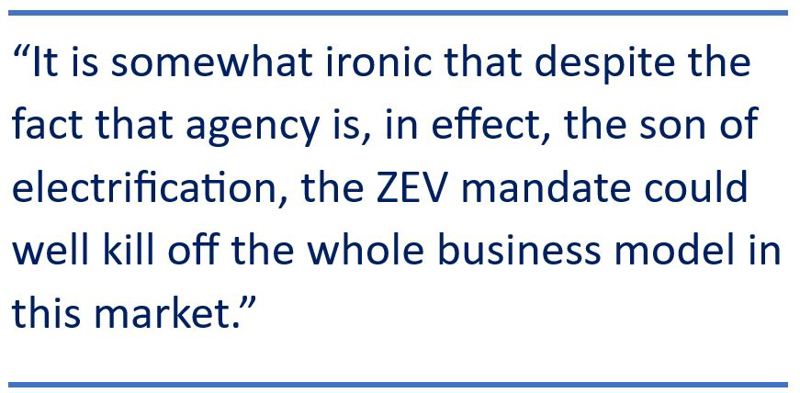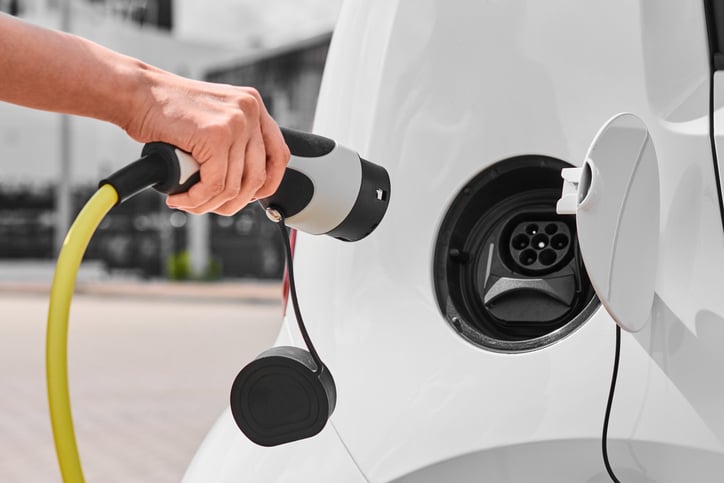Andy Goss, chairman of AM100 motor retailer Vertu Motors and a former car sales boss of Jaguar Land Rover, Porsche and Toyota, sends a warning to the new Labour Government that the tough targets for driving motorists into electric cars are a blunt instrument that unintentionally may speed the exit of some franchised dealer groups.
There can be little doubt that the new Labour government has experienced the shortest honeymoon period ever. They walked into government with an expectation that there were inevitably some real big issues to resolve, especially in the political arena.
Of that there was no doubt. However, their expectation of trouble ahead would’ve been tempered by the fact that the economy was in much better shape than of recent times with low inflation and interest rates about to fall.
Andy Goss, chairman of AM100 motor retailer Vertu Motors and a former car sales boss of Jaguar Land Rover, Porsche and Toyota, sends a warning to the new Labour Government that the tough targets for driving motorists into electric cars are a blunt instrument that unintentionally may speed the exit of some franchised dealer groups.
There can be little doubt that the new Labour government has experienced the shortest honeymoon period ever. They walked into government with an expectation that there were inevitably some real big issues to resolve, especially in the political arena.
Of that there was no doubt. However, their expectation of trouble ahead would’ve been tempered by the fact that the economy was in much better shape than of recent times with low inflation and interest rates about to fall.
Ironically, they seem to totally miss read the runes in terms of key environmental issues. Ed Miliband, in particular appears to followed an idealistic, and perhaps unrealistic, view of the environmental challenge with little consideration as to the practicality of trying to move forward initiatives in the so-called “climate crisis“. Clearly, the automotive industry has a keen interest in this area, particularly at a time when there is a substantial move from ICE vehicles to those with electric powertrains.
It appears to be the case that neither the previous government, nor the new incoming government quite realize the impact on the automotive industry of the desire to speed up the move towards the electrification of the car market.
In particular they appear to have misread some of the potentially negative impact this speeding up process has on the industry and sector as a whole.
 The ZEV mandate is creating substantial angst for both the original equipment manufacturers as well as the retailers. Rather than generate a consumer pull towards electric vehicles, recent governments, and indeed, the new one seem hell-bent on pushing consumers towards vehicles which they are not yet ready to adopt.
The ZEV mandate is creating substantial angst for both the original equipment manufacturers as well as the retailers. Rather than generate a consumer pull towards electric vehicles, recent governments, and indeed, the new one seem hell-bent on pushing consumers towards vehicles which they are not yet ready to adopt.
The whole concept of the ZEV mandates is flawed and is based on a fundamental misunderstanding of the British psyche as an island race, who are determinedly not prepared to be told what to do by authorities and regulators when it conflicts with their desire for a certain degree of civil liberty.
This has been forever true.
 The ZEV mandate is an incredibly blunt instrument, pushing car manufacturers to sell a certain percentage of their vehicles as battery electric vehicles, irrespective of the consumer appetite to adopt them. This year 22% of each OEM’s sales are supposed to be those of the BEV variety moving up to the higher level of 28% in 2025.
The ZEV mandate is an incredibly blunt instrument, pushing car manufacturers to sell a certain percentage of their vehicles as battery electric vehicles, irrespective of the consumer appetite to adopt them. This year 22% of each OEM’s sales are supposed to be those of the BEV variety moving up to the higher level of 28% in 2025.
That 28% figure appears to be substantially out of reach for the industry as a whole with certain OEMs clearly stating the fact that they are extremely uncomfortable with the situation even to the point of potentially winding down of UK manufacturing facilities.
The whole situation is creating substantial concern, and indeed fear, across the industry as many retailers are now being told to sell a two to one ratio of ICE vehicles to BEV in order to support the OEM targets. This is proving extremely difficult to achieve as consumers are clearly concerned about the price of the vehicles,the charging infrastructure, and indeed, in many cases range, anxiety.
The fleet market is responding on the back of certain fiscal advantages for BEVs but retail demand is nowhere near that needed to achieve targets. Last week’s SMMT data highlighted this very situation.
So something will have to change.
Of course, it is very early days into the new government with many inexperienced ministers only just getting to grips with their new portfolio. Unfortunately, in this area time is not on their side.
Even more so it is not on the side of the OEMs. The substantial fines associated with missing the ZEV mandated targets are so severe that they effectively wipe out the total unit profitability of many ICE vehicles. Therefore, many OEMs are faced with a very tough choice, pay the fines or reduce your ICE sales.
Frankly, it’s a pretty awful choice.
The degree of flexibility in terms of achieving these targets is now even more concerning for those OEMs which have enacted, or are considering a change, from the franchise model to that of agency.
At a time when retailers are being asked to push substantial BEV vehicles into the marketplace against the backdrop of a very weak level of retail consumer demand, agency is the last thing that OEMs need if they are to try and achieve their overall sales goals in the correct mix between traditional ICE vehicles and new BEV vehicles.
Many OEMs are waking up to this situation and have genuine concern.
 It is somewhat ironic that, despite the fact the agency is in effect the son of electrification, the ZEV mandate in itself could well kill off the whole business model. In the new agency world, the OEM or national sales company is responsible not just for demand generation but also to a large extent demand fulfillment.
It is somewhat ironic that, despite the fact the agency is in effect the son of electrification, the ZEV mandate in itself could well kill off the whole business model. In the new agency world, the OEM or national sales company is responsible not just for demand generation but also to a large extent demand fulfillment.
At a time when retail consumer demand for BEVs is not there at the appropriate level to achieve mandated targets, OEMs once again become over reliant upon the retail organizations to fill that sales gap.
It’s going to be hard enough to do that in the franchise model - virtually impossible for some with agency.
So 2025 could will be a pivotal year. Not just for the new Labour government as it will simply have to come off the unrealistic ZEV Mandate targets as currently laid down if it wants to avoid a fundamental economic and employment disturbance in the sector. Also for many OEMs, who are considering or currently operating the agency model.
All of this will undoubtedly create more consolidation in the retail sector and will create questions for many many regional groups, who really wonder whether or not all this is worthwhile..
This industry of ours is never boring. That is for sure.
Author: Andy Goss, chairman, Vertu Motors
Login to continue reading
Or register with AM-online to keep up to date with the latest UK automotive retail industry news and insight.
















SCatlin - 12/09/2024 09:09
Whilst the challenges for the industry laid out here are very real and concerning, I think we need to be careful about how the industry talks about this. Using phases like "so called 'Climate Crisis'" has the potential to be read as either not understanding, or worse, not caring about the gravity of the environmental situation we all face.